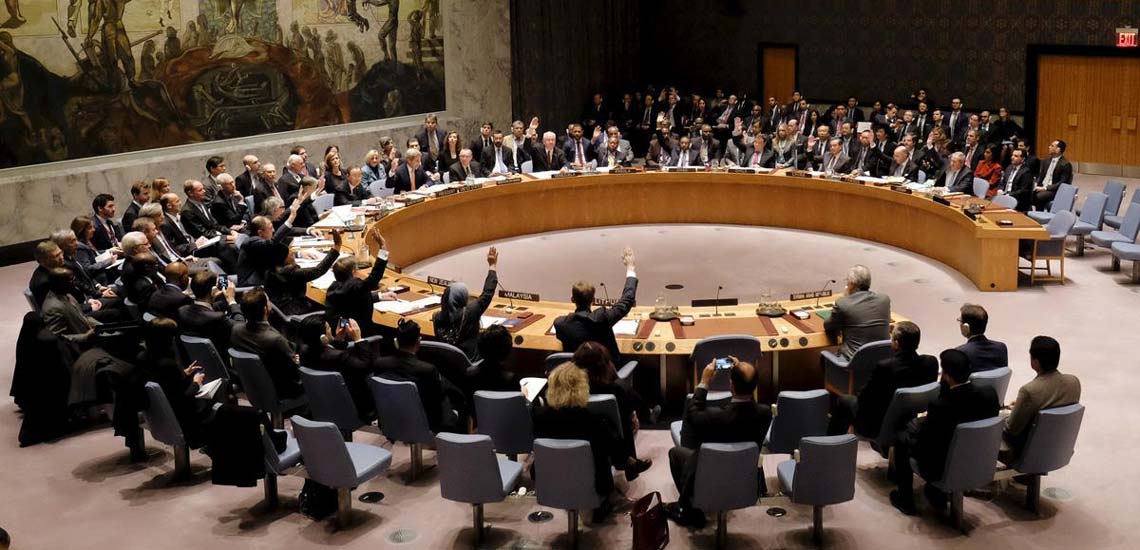Alwaght- The Saturday night UN Security Council resolution about immediate aids to Gaza drew massive criticism as an inadequate move, with many arguing that even this resolution had failed to make a ceasefire. The resolution came after days of delay.
The resolution does not call for a ceasefire in Gaza, and some have described it as “sadly insufficient and meaningless”. The resolution simply called for measures to “cease hostilities” and passed on Friday with 13 votes in favor and none against, with the US and Russia abstaining. It also called on all parties to facilitate and enable the immediate, safe and unimpeded delivery of humanitarian aid to the Palestinians.
The resolution was approved after several postponements and after tough negotiations behind closed doors with the aim of getting Washington’s green light to avoid vetoing it, as the previous motion was vetoed by the Washington last week. While UN Security Council resolutions are binding, Al Jazeera’s Alan Fisher reports that Israel is likely to ignore the resolution.
Negative reactions to incomplete resolution
Gaza health authorities have announced that since the start of the war on October 7, more than 20,000 people, about 70 percent of whom children and women, have been killed in Israeli ground, air and sea attacks. While senior UN officials and international aid agencies welcomed the call for more humanitarian aid to Gaza in the Security Council resolution, they said that given the displacement of 2.3 million of Gazans and existence of risk of imminent famine and disease outbreak, the resolution is incomplete and that ending Gaza crisis takes a more serious and stronger one.
Tedros Adhanom Ghebreyesus, head of the World Health Organization (WHO), welcomed the resolution, but described an immediate ceasefire much more necessary, a concern not mentioned in the resolution.
Scott Paul, of Oxfam America, also announced in an interview that this resolution cannot stop the crisis in Gaza and is almost useless.
Also Agnes Callamard, the secretary-general of Amnesty International, said that all efforts to address the “unprecedented humanitarian catastrophe” in Gaza should be welcomed, but an “immediate ceasefire” is much more necessary. She said the resolution was “significantly weakened” and “inadequate” and it was a shame that the US used its veto to weaken the resolution by removing the necessity of a ceasefire.
Tamer Qarmout, assistant professor in public policy at the Doha Institute for Graduate Studies, told Al Jazeera that the vote showed how the UN has become “irrelevant” to resolving the war.
“When the UN was formed after World War II, it was supposed to tackle, to prevent similar conflicts such as the one happening in Gaza,” he said. “But it’s a political organisation that is controlled by powerful countries, especially those with veto power at the UN Security Council. So politics is there in every policy and little detail of the UN work.”
He continued: “I don’t think this war can be resolved through UN channels … The UN is becoming irrelevant, marginalized, very politicized and its mandate is being questioned now.”
Ardi Imseis, assistant professor of international law at Queen’s University in Canada, said the UNSC has yet again failed in its responsibility to safeguard international peace and security due to the actions of one member, the US, which is protecting its ally Israel, according to Aljazeera.
Why is UN incapable of stopping the war?
The UN failure to enforce a ceasefire in Gaza showed how power-based politics can undermine the principles of the rules-based international order. Although the UN General Assembly successfully passed a resolution calling for a ceasefire and humanitarian measures to protect civilian lives in Gaza, the world is witnessing a deadlocked system in the Security Council, blocked by the big powers and their geopolitical interests. Since the establishment of the Israeli regime in 1948, Washington has vetoed resolutions condemning Tel Aviv and its occupation 46 times, using its veto right more than any other country.
The sad fact is that without serious reforms to the UNSC structure like abolishment of the veto and democratization of the UN, the current situation of this international body will continue, which means resolving future conflicts will remain beyond its power.



























